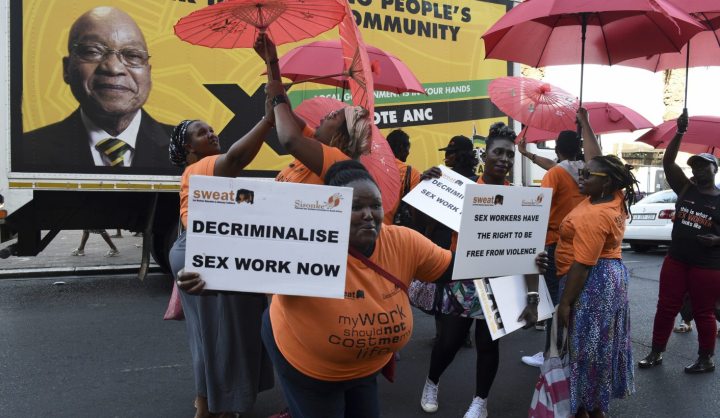South Africa
Reflections from a parliamentary summit: Sex work vs prostitution – time to get the difference

The parliamentary Multi-Party Women’s Caucus Summit with Stakeholders on responses to the Report of the SALRC Project 107 Sexual offences Adult Prostitution illustrated that sex work in South Africa is still greatly misunderstood. Little effort has been made to understand it or its participants. By APHIWE NGALO.
The old Assembly chamber housed a day-long summit on Monday on the legalisation of sex work in South Africa. Numerous groups gave submissions in response to the 500-page report compiled by the Department of Justice.
The Sexual Offences Act, 1957 currently forbids prostitution, brothel-keeping and procuring, and other activities related to prostitution.
The recommendations made by Sisonke, the National Sex worker Movement of South Africa and the Commission of Gender Equality among others, was that sex work should be entirely decriminalised and that proper consultations should be made with self-identifying sex workers rather than the perspective provided in the report, which was seen as a morality-based perspective against sex work. A representative from the Centre for Applied Legal Studies shared these sentiments saying “the law reform report did not adequately engage with the views and experiences of sex workers”.
In the report, sex work is referred to as prostitution, while the sex workers themselves say that they would rather be referred to as sex workers. The Open Society Foundation explains that by referring to “sex work” as “work” one recognises that it is “work”, while calling it prostitution is “demeaning and stigmatising, which contributes to their exclusion from health, legal, and social services”, which is exactly what sex workers have been experiencing.
With that being said, Mickey Meji, a founding member of Kwanele Survivor Movement – a network representing survivors of the system of prostitution – was against decriminalisation.
“Myself and all the women in Kwanele, some who sell sex, used to and are in the process of leaving that life, feel patronised by the use of the terminology ‘sex work’ because we find that something we had to do because of our circumstances has been normalised and what we view as violence against women.”
She argued that “prostitution is not the solution to our unemployment, it is not entrepreneurship, people enter prostitution because of difficult circumstances,” and that “decriminalisation of sex work will be costly to the state”.
Allie Dee (stage name), a representative of the Stripperoke Team and a sex worker, pointed out that there was a variety of sex workers – crossing all genders and trans people, gender-queer people including men, gay and straight. “Sex workers should not need to legitimise their choices,” she said. In support of decriminalisation, she added that “ the idea that jobs outside the sex industry are inherently more dignified, puts people in a place where they must accept cheap labour to support themselves and their families. If this does not work out and they go back to sex work they have made an undignified choice, the choice not to be a good woman”.
Crystal Clear International Ministry supported the law as it currently stands. In explaining their position on decriminalisation, a representative said: “As a country we should deal with our issues and not try to find the easy way out by decriminalising sex work.”
Her position was very clear. “‘Prostitution’ harms one mentally, physically and emotionally.”
EFF party whip Ntombovuyo Veronica Mente responded to Crystal Clear by asking how “saying decriminalisation of sex work will add to fraud, and money laundering, how are they related to a right, because we are talking of an issue of a right to access safe sex work here”.
From the summit, you can see that people who are sex workers want decriminalisation to happen, while those who are survivors of sex trafficking are against its decriminalisation.
It is important to note the difference. “Sex workers” go into sex work willingly, while “sex trafficking” involves the trafficking of people against their will and sexually exploiting them.
The arguments presented against decriminalisation had language that suggested that the dignity of a person is harmed by sex work. The resistance by people to refer to sex work as employment further illustrates that people do not recognise it as work and that people are not willing to listen to those who they are making laws about. (See earlier report here.)
After a day of listening to the submission of different organisations, MP Masefele Morutoa said: “We will continue engaging on this issue, we will collate all the views presented here and engage further on the report that will emanate from today’s session. We will do everything… to ensure the country adopts and appropriate legislative reform. We will continue further engagement with the South African Law Reform Commission and the Ministry of Justice, and non-governmental organisations working in the sector.” DM
Photo: Sex workers demonstrate outside Parliament ahead of the Opening of Parliament ceremony and State Of The Nation Address (SONA) by then president Jacob Zuma in Parliament, 09 February 2017. EPA/JUSTIN SHOLK

















 Become an Insider
Become an Insider